Phitsanulok and Sukhothai
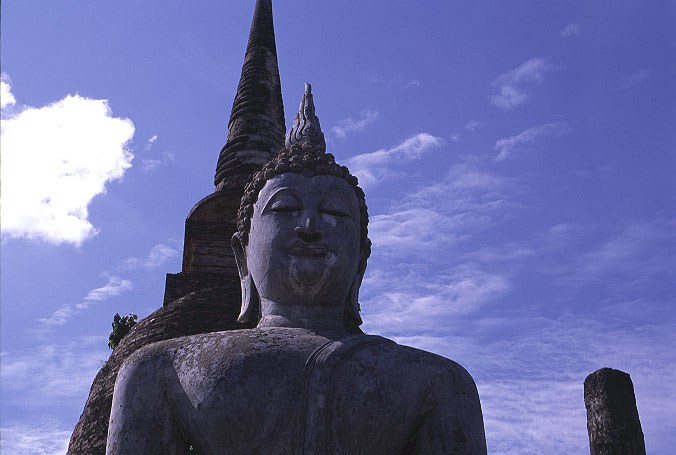
December 14, 2006
Hualamphong. Thailand. Dunkin Donuts. My first mistake in country. Rather than getting a nice sack of pineapple, I had instead spent eight times the amount for two donuts and a cup of coffee, all three items of the wretched quality as I would get in the States. The morning air was still cool, or rather not yet hot, and the wait in the train station was not overly unpleasant. Indeed, helpful attendants in pink short sleeve shirts and ID badges around their necks would come by every few minutes to see if I needed help. I had booked a morning train which meant that I would get in to Phitsanulok in the early afternoon, giving me plenty of time to explore the town. The guidebook I was carrying indicated that there wasn't much in town itself and it was only used as a jumping off place to visit the ruins at Sukhothai.
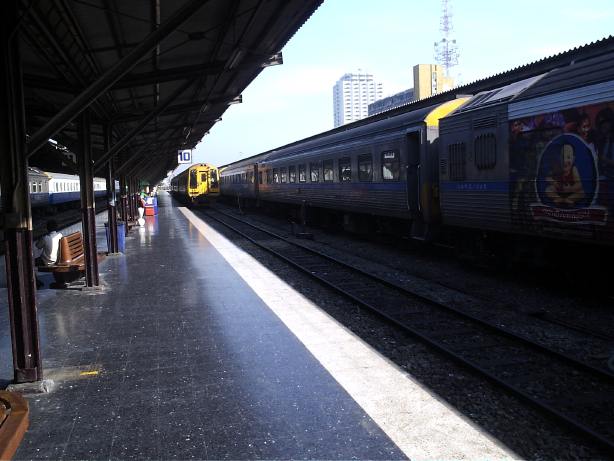
My car on the special express diesel train was nearly empty and there was plenty of room for a rangy western to stretch out in comfort. I hadn't taken a long distance train trip since I was last in France, approximately 20 years ago and was looking forward to the opportunity to watch the countryside of Thailand roll by. Unfortunately, the air conditioning was cranked up so high that after thirty minutes I had goosepimples on my arms and spent most of the five hour journey shivering. It was with great relish that I stepped off the train into the sweltering afternoon air at the Phitsanulok train station.
Although my fancy car had gotten a free lunch and hot tea, hunger tore at my belly. Outside of the train station there sat a fleet of tuk-tuks, which had little use in assuaging my hunger. Just beyond them, however, was the market. A large,sprawling, utterly interesting market that consumed a massive square covered area and spilled out into the streets along side it. Hmm. Guidebook didn't mention that. I found a man with a grill and got three skewers of grilled chicken-on-a-stick for 10 B (25 cents) before strolling around the corner to the Asia Hotel, whose chief quality was that it was close. The girl behind the counter was helpful and friendly, though she spoke as much English as I did Thai. The room was windowless and a little charmless, but had a rock hard (read: comfortable) bed, a TV, and air conditioning. All mine for 300 B. I dropped my pack and returned to the market, where I found a women grilling up an interesting sort of savory pastry. Made from a shell of rice flour, the four pastries I bought were stuffed with either seasoned greens or carrots and were topped with a sweet and spicy sauce. Although I asked repeatedly what the name of the pastry was, I couldn't quite understand what the woman told me.
Phitsanulok was supposed to have nothing for the tourist, but I would have come here just to eat the 25 cents worth of food I had just consumed. The streets of the town were busy, but were filled only with local people going about their daily lives and I could not spot another tourist anywhere in the area. Strolling along the river, I passed a series of schools right as classes were letting out, and the street was flooded with young Thai children, in a variety of uniforms, doing what school children the world over do: Chat, laugh, and smile. Wat Phra Si Ratana Mahathat came far too soon.
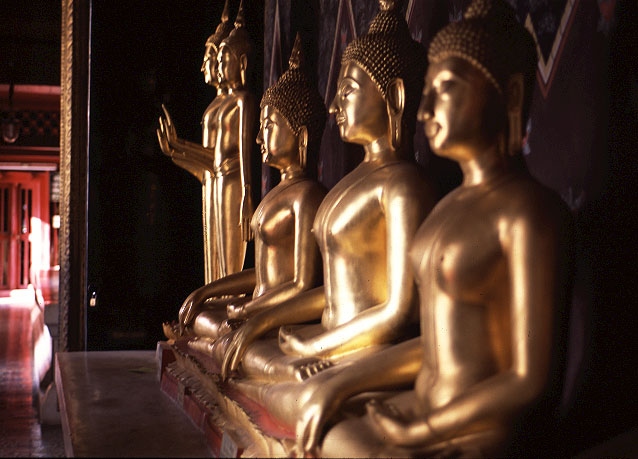
The temple with the long name was better known as Wat Phra Si and housed a famous Buddha image. I had seen lots of Buddha images so far and was not an expert in the area of Buddha replication. What was far more interesting were the people moving about. Not a farang destination, Wat Phra Si seemed a destination for the Thai, much as the mosques in Syria had been. I saw what I could see and then lounged about with nothing in particular in mind. I had nowhere to go and nothing to see, and plenty of time to do both. So, why not lounge for a bit?
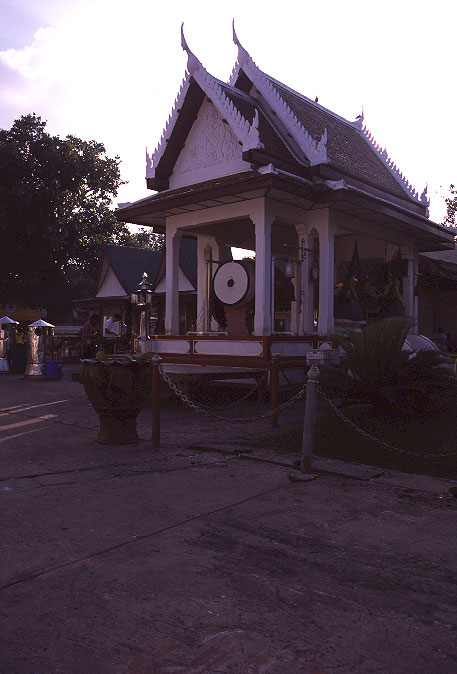
The heat of the afternoon was fading as I started toward the gates of the wat. A saffron robed man waved at me, hailing me to a meeting. The monk was not from Thailand, but perhaps was of Thailand. We sat at a table and talked, joined by a younger apprentice monk. The young monk had been in the order for eight years. This was Monk Chat, as a sign over the table proclaimed. An opportunity for people like me to learn something of Buddhism, it was also an opportunity for monks to practice their English and remain connected, or rather informed, about the outside world. Not outside as in political topics or commercial values, but rather connected to people who functioned in the more mundane arena of everyday life.
I was not impressed. The elder monk was competitive with the younger monk over duration of meditation. Buddhism was a philosophy, not a religion. There was a soul. He was here to make up for his younger years. The younger monk was there because his parents told him he had to be a monk. For thirty minutes we conversed on nothing of substance. And then things changed. What was love, the elder monk asked me. I could have spewed forth with Plato's notion of true love, or with a biochemical definition in terms of addiction. I could have recited the litany of definitions, observations, and aphorisms that I had stored inside of me. But it seemed pointless to say what I did not know inherently. At a loss, we talked about characteristics of love, and finally the big topic. "Is love possible without attachment?" the elder monk queried. I actually thought about the question, rather than replying with a set stock of phrases. Can one love without being attached to the object of love? I didn't really know and told the monk so. "Ah, understand that one can love, can feel love, without grasping the object of that love tightly. That is compassion." Just as a parent can love a child immensely, completely, so too can that parent let go of the child as the child becomes an adult. The love is not diminished. Only the attachment is.
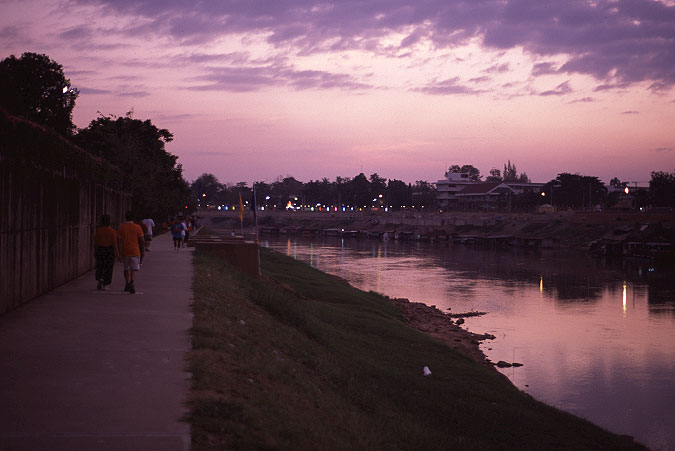
I was struck, and obviously so. "So, I have given you something to think about, I see." My mind raced, struggling to grasp hold of something tangible, familiar. Something that I could anchor myself to and use as a base from which to argue. But I could not find such a thing. Instead, I could only see my past and how I had failed. And what I still had yet to do. I left as the sun was beginning to set and strolled along the river, deep in thought and without a care as to where I ended up. I had more important things to do than to lounge.
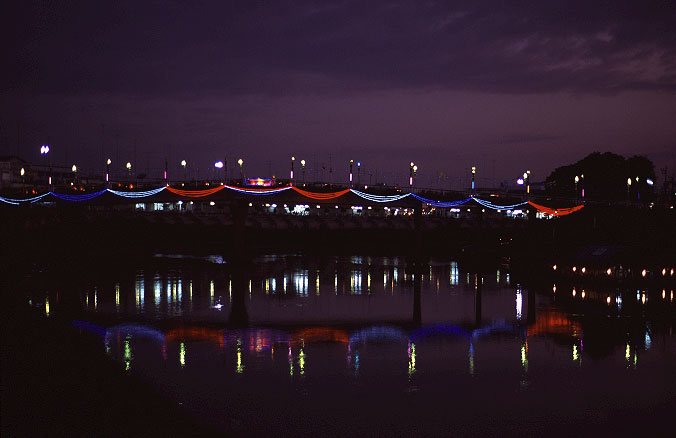
I found myself at a riverside cafe drinking a Singha and eating a plate of chili prawns, the world quite dark, and wondering what sort of conversation I had actually had with the elder monk. During the summer I had had experiences that made me question the validity of my ability to record reality as it actually had happened and I wished I had had some sort of recording device to know what the monk and I had actually talked about. Our actual words, rather than my interpretation of them. Had I put words into his mouth? Had I actually talked to someone? I had only my memory of the events, and my memory was no longer to be trusted.
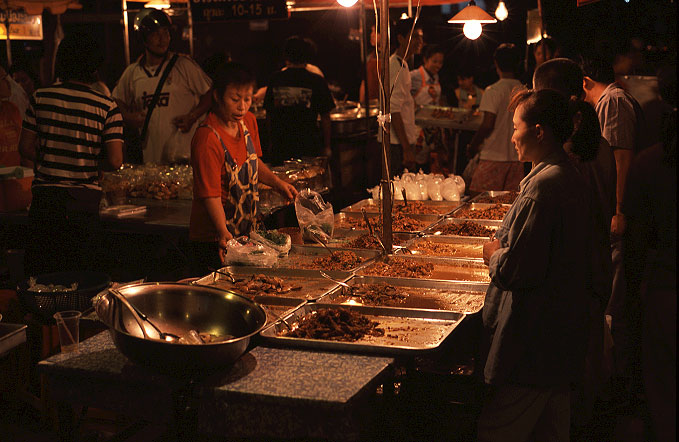
Wandering back to my hotel, I stopped off at the same market where i had had the excellent dumplings after hopping off the figid train. Large in the afternoon, the market had taken on mammoth proportions in the evening. It seemed as if the entire town had congregated amongst the food and clothing stalls. Everything could be had here, except a Big Mac, I suppose.
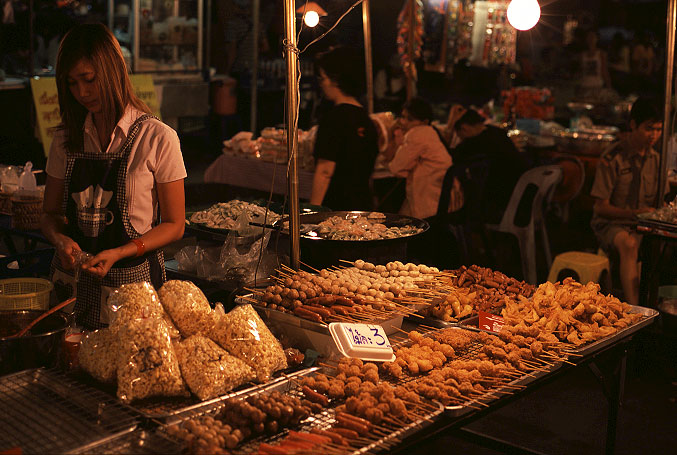
Despite having just eaten, I had a seat in a plastic chair next to which a man with a propane fired wok was tossing noodles. A plate of something with greens and prawns came to me. It didn't matter what it was, it was better than any Thai food I had had in any restaurant in the US or Canada. And it cost me 50 cents. A bit further down I sampled three different meat-on-a-sticks, mostly chicken and pork. Fast food done right. But the best was yet to come. Two women specialized in seafood noodle salad, a combination that I just couldn't pass up, despite my bulging belly.
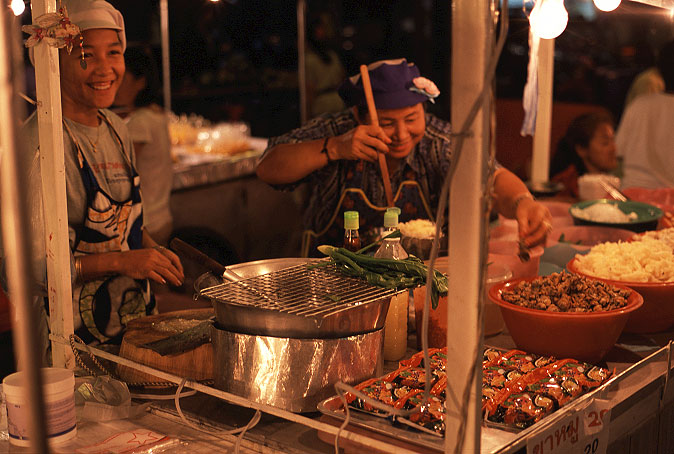
Calamari, ground chicken, vegetables, and, oddly enough, hot dogs were tossed with a chili-lime dressing and rice sticks. When I asked for "peht peht!", the woman grinned demonically as she tossed in a large spoonful of a dark red mixture, laughing as she went. Packed into a container, I retired to the Asia hotel, directly around the corner, with a few beers and my treasure.
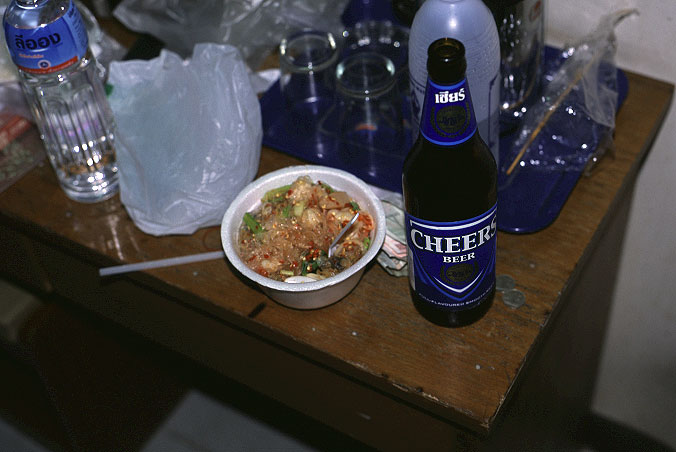
The explosion of flavor dwarfed the already monumental dishes I had thus far had in Thailand. The level of chili-heat pushed my limits, admittedly high, to the breaking point, but I couldn't keep myself from scarfing down the meal. For 50 cents I had had the greatest salad of my life in a town that had nothing for tourists to do. Laying on the bed and watching the various Thai language television stations, I felt waves of travel-euphoria roll over me, though knowing that I should have been contemplating the monks words from earlier in the day. I couldn't. I could only wrap myself in the cloud of the perfect present. Could only lay on the bed and feel good.
After the wonderful market last night, there was no way I was moving on from Phitsanulok today. Instead, I tossed my camera in my pack and walked out to the train station where I caught a tuk-tuk toward the bus station, intending to travel out to Sukhothai as a day trip. Sukhothai is one of the main cultural tourist sites in Thailand, being one of the capitals of ancient Thailand. The tuk-tuk broke down along the highway and I had to hop out and help push it over to the side, where the driver spent a few minutes re-wiring the battery. Another short ride got me to the bus station, and a 75 minute ride from there to Sukhothai ensued. Contrary to my expectations and the assertions of the guidebook, the bus dropped me off right at the entrance to the park instead of in the main part of town, several kilometers away.

After stopping at a food stall for a plate of som tom and rice, I paid my 40 B admission fee to the central area and stepped into the outdoor museum that is Sukhothai Historical Park. Large and sprawling, the park was best seen, according to the guidebook, by renting a bicycle or motorbike and cruising around. This seemed rather laughable as the main area of the park could only be a few square kilometers, hardly a size requiring mechanized transport.
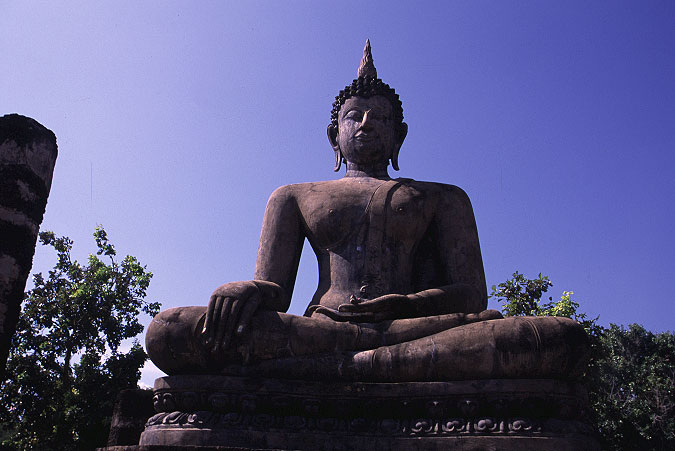
Buddha could be seen everywhere, from large statues to small carvings, complete with signs warning tourists not to sit in the Buddha's lap.
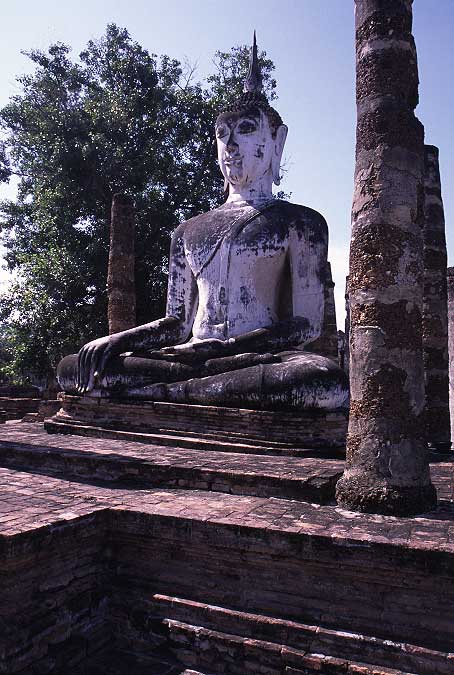
My energy and drive to see yet more statues of Buddha faded after an hour and I quickly sought out the shelter of a bit of shade next to a canal, where it was cool. I relaxed and pondered the monks words of the day before, wondering if it was possible to love without attachment.
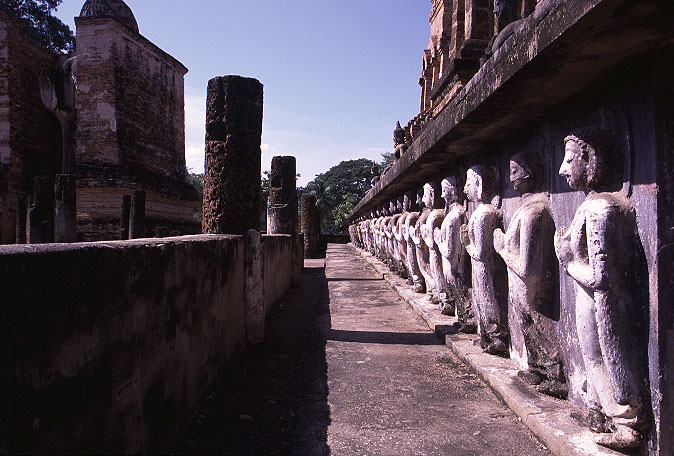
The cause of suffering is desire, or attachment, according to the Buddha. Perhaps there is no Love, only qualified love. Love with attachment is simply a desire to possess something, for whatever reason. Love without attachment is compassion, the end-goal for many Buddhists.
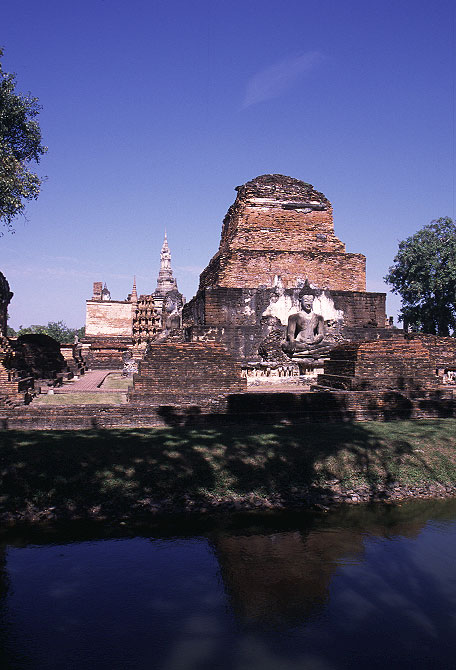
If this is the case, then the question becomes: How can one foster love while at the same time avoiding attachment to the object of the love?
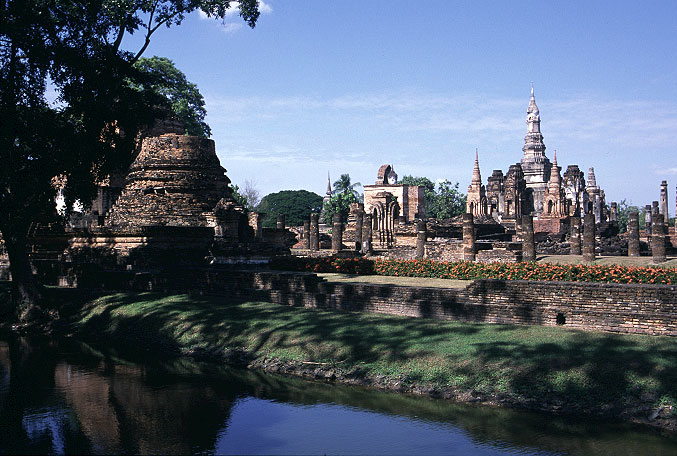
All this assumed, of course, that it was even possible to love without being attached, and that assumption was based on nothing other than my own biases: I wanted it to be true, so I asserted it to be true.
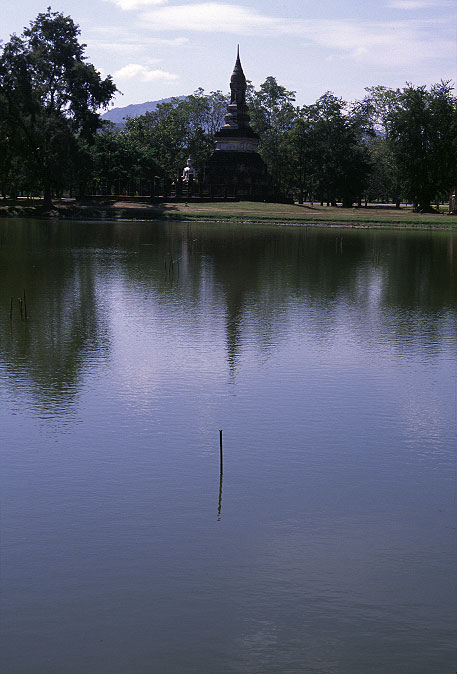
If it was not possible to separate love and attachment, then compassion must be something else. This didn't make sense. Compassion, love, and so on are not thing that one can point and say, "This is it! I have classified it!" Like trying to squeeze Jello or herd cats, you just couldn't do it. Intrinsic wisdom was needed, not a mathematically precise definition. I was no closer to any measure of understanding. I needed to find the monk again before I left the area. After making a full tour of the park I decided that I had absorbed enough culture for a while and wanted to head back to Phitsanulok to live in the present for a while. The night market held more attractions for me than the UNESCO World Heritage Site of Sukhothai. The statues and wats of the park were a measure of the past, something I could read about in books. The feeling of the present in the market place couldn't be duplicated in a book or in a photo essay. You had to be there to understand it, to absorb it, to appreciate it. It felt so odd, yet so right, that I would travel around the world to hang out in a market, that I would find row after row of food and craft vendors to be more appealing than ancient works of art. But that is how it was.

As much as I liked Phitsanulok, it was time to leave for the north, for Chiang Mai. I bought a ticket on a 1 pm north bound train, which would get me in to town around 9 pm and gave me plenty of time to try to track down the monk. And to poke about in the market a bit more during the day time, when the primary vendors were hawking ingredients for meals, rather than the meals themselves.
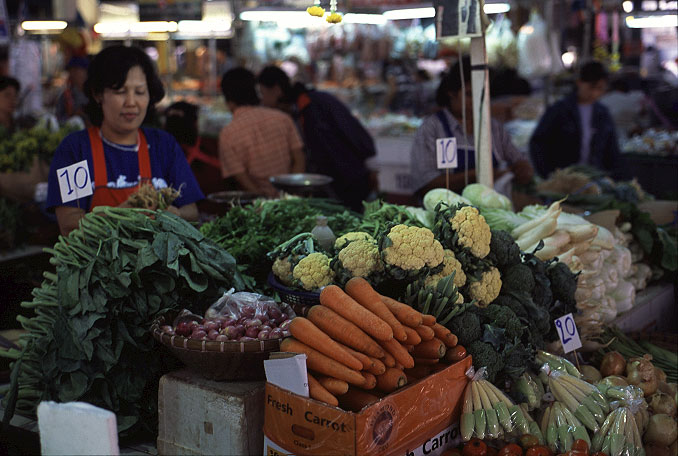
As always happens in a foreign country, much of the produce was quite recognizable: Carrots are carrots, no matter if they are in Thailand or the States. However, the varieties are different and, for the most part, the Thai versions looked better: Deeper colors, better skin, and certainly fresher than anything one could buy in a supermarket.
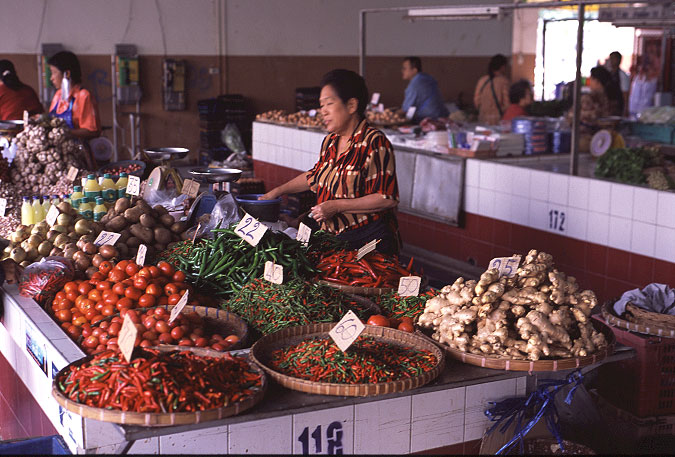
Some of the produce was quite new to me, though I could guess at its function and flavor, based on what I had had to eat so far. Baskets of bright chilis, heaps of solid greens, prepared spice mixes, curry pastes, and other semi-prepared ingredients dotted the market, which was jammed with people doing the morning shopping. I wandered through the produce area of the market and into the fresh meat area. Beyond many of the standard items, there were parts of the pigs and chickens that were quite recognizable, such as skinned heads and feet. As I progressed through the market, the internal organs became more prominent. I didn't exactly feel ill, but neither did I have much hankering for sausage. I settled for some savory pastries instead.
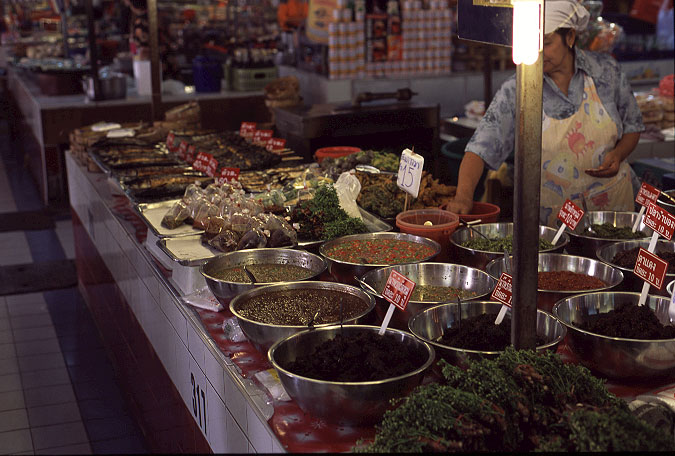
With my last excursion to the market over, I walked down to the river and followed it along to Wat Phra Si in seach of the monk. Although a few saffron robes moved about, I couldn't spot the elderly monk that I had spoken with a few days ago. I didn't know his name and felt awkward directly asking a random monk in the wat to help me understand something that could only be known, not taught. A bit disappointed, I left the wat and headed back to the train station to catch my lift north.
The key to easy travel, whether on a train, bus, or airplane, is to have a bottle of whiskey, or rum, or Scotch at your side and to seek relaxation in it. I didn't even mind being 80 minutes late getting in to Chiang Mai after downing a third of a liter of local rice whiskey. A tuk-tuk driver gladly took me in to town for 50 B and deposited me at the Sumit hotel, conveniently located across the street from a cafe that, though closing down, wok-ed me up a plate of wide rice noodles with egg, chicken, and chinese broccoli. Tired, I declined the pleasures of a Chiang Mai evening and turned to the solid bed whose use I had bought for 300 B.





















